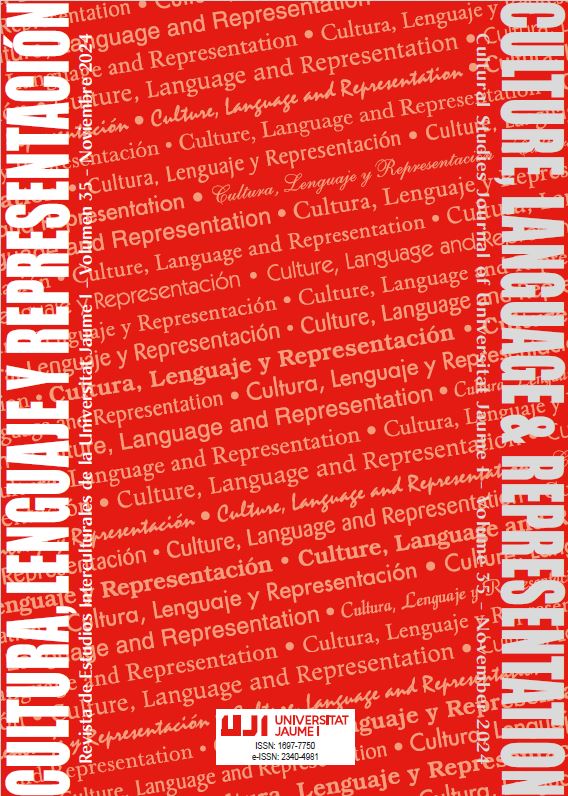The Retrospective Infinitive in Spanish, a form of reproach? A discursive approach
Main Article Content
Abstract
This study presents a discursive characterization of the Spanish construction haber + past infinitive, also known as the retrospective infinitive (Bosque, 1980), as a form used to convey reproach. To this end, several research questions are asked. First, what are the main characteristic attributes of haber + past participle? Is there a high degree of coincidence between the inherent features of this construction and the defining characteristics of reproaches in general? To what extent does context condition the relation between haber + past participle in a reproach? Finally, and in relation to the latter question, what discursive patterns can be identified in the use of the construction? Examples will be drawn from five corpora, thus real data are used in support of the conclusions, which constitutes one of the main novelties of the study in relation to previous work in the area. Results reveal that there is a high degree of coincidence between the attributes that characterize the past infinitive and the criteria that typically convey the reproach itself. From a discursive perspective, three main patterns are observed to emerge when this structure is used: neutralization and mitigation of the reproach, the expression of rebuttal and disagreement, and the development of argumentation.
Downloads
Article Details

This work is licensed under a Creative Commons Attribution-ShareAlike 4.0 International License.
An open-access CREATIVE COMMONS copyright license is used. Those authors whose works are published by this journal, accept the following terms:
- Authors will retain their copyright and guarantee the Journal the right to first publish their work, which will simultaneously be subject to the Creative Commons Recognition License CC BY SA that allows third parties to share the work, provided that its author and first publication is indicated.
- Authors may adopt other non-exclusive license agreements for the distribution of the published version of the work (e.g., deposit it in an institutional telematics file or publish it in a monographic volume) provided that the initial publication in this journal is indicated.
- Authors are allowed and recommended to disseminate their work over the Internet (e.g. in institutional telematics files or on their website) before and during the submission process, which can produce interesting exchanges and increase quotes of the published work.
Funding data
-
Ministerio de Economía y Competitividad
Grant numbers MICIU/AEI/10.13039/501100011033/ -
Ministerio de Economía y Competitividad
Grant numbers PID2020-114805GB-I00 -
Ministerio de Ciencia e Innovación
Grant numbers MCIN/AEI /10.13039/501100011033
References
Albelda Marco, Marta (2022). ¿No te das cuenta de que me estás molestando? Las recriminaciones intensificadas mediante preguntas retóricas. Oralia, 25(3), 9-32. https://doi.org/10.25115/oralia.v25i2.8065
Biezma, María (2010). Inverted antecedents in hidden conditionals. En S. Kan, C. Moore-Cantwell, & R. Staub (Eds.), Proceedings of North East Linguistics Society 40. Graduate Linguistics Student Association. https://mariabiezma.
files.wordpress.com/2012/10/biezmapaperrevised.pdf
Bosque, Ignacio. (1980). Retrospective Imperatives. Linguistic Inquiry, 11(2), 415-419.
Burguera Serra, Joan Gabriel (2010). Gramática y pragmática de la interrogación retórica en español. Una aplicación al debate parlamentario [Ph.D. Thesis, Universitat de Barcelona]. En TDX (Tesis Doctorals en Xarxa). https://www.tdx.cat/
handle/10803/1705
Duinhoven, Antonius Maria (1995). «Had gebeld!» De irreële imperatief. Tijdschrift voor Nederlandse Taal- en Letterkunde, 111(4), 346-364.
Estellés-Arguedas, Maria (2015). Expressing evidentiality through prosody? Prosodic voicing in reported speech in Spanish colloquial conversations. Journal of Pragmatics, 85, 138-154. https://doi.org/10.1016/j.pragma.2015.04.012
Evans, Bryn (2017). Sports coaching as action-in-context: Using ethnomethodological conversation analysis to understand the coaching process. Qualitative Research in Sport, Exercise and Health, 9(1), 111-132. https://doi.org/10.1080/
X.2016.1246473
García Ramón, Amparo (2018). Epistemicidad en interacción: (A)simetrías epistémicas en secuencias de acuerdo y su relación con la construcción de roles funcionales en conversaciones y entrevistas [Doctoral thesis]. https://roderic.uv.es/
handle/10550/69401
Goldberg, Adele E. (1995). Constructions: A construction grammar approach to argument structure. University of Chicago Press.
Gutiérrez Ordóñez, Salvador (1997). La interdependencia en sintaxis. Cauce: Revista Internacional de Filología, Comunicación y sus Didácticas, 20, 703-725.
Heritage, John (2012). The Epistemic Engine: Sequence Organization and Territories of Knowledge. Research on Language and Social Interaction, 45(1), 30-52. https://doi.org/10.1080/08351813.2012.646685
Herring, Susan C. (2010). Computer-mediated conversation Part I: Introduction and overview. Language@Internet, 7(2). http://www.languageatinternet.org/
articles/2010/2801
Ilie, Cornelia (1994). What else can i tell you?: A pragmatic study of english rhetorical questions as discursive and argumentative acts. Almqvist & Wiksell.
Méndez Guerrero, Beatriz (2015). Corpus Oral Juvenil del Español de Mallorca (COJEM). https://ebuah.uah.es/dspace/handle/10017/25298
Plantin, Christian (2005). L’argumentation: Histoire, théories et perspectives. Presses Universitaires.
Portolés Lázaro, José (1989). El conector argumentativo «pues». Dicenda: Estudios de lengua y literatura españolas, 8, 117-134.
Stevanovic, Melissa (2018). Social deontics: A nano-level approach to human power play. Journal for the Theory of Social Behaviour, 48(3), 369-389. https://doi.org/
1111/jtsb.12175
Stivers, Tanya (2008). Stance, Alignment, and Affiliation During Storytelling: When Nodding Is a Token of Affiliation. Research on Language and Social Interaction, 41(1), 31-57. https://doi.org/10.1080/08351810701691123
Van Olmen, Daniël (2017). Reproachatives and imperatives. Linguistics, 56(1), 115-162. https://doi.org/10.1515/ling-2017-0033
Vicente, Luis (2013). Past counterfactuality in Spanish imperatives and its implications for the analysis of imperatives. https://semanticsarchive.net/Archive/
DM5ZGY1N/vicente---past-counterfactuality-in-spanish-imperatives.pdf
CORPORA
Albelda, Marta & Estellés, Maria (Coords.). Corpus Ameresco, Universitat de València, ISSN: 2659-8337, Available online at .
Albelda, Marta & Estellés, Maria (Coords.). Corpus ESPRINT, Universitat de València (unpublished).
Briz, Antonio, & Grupo Val.Es.Co. (2002). Corpus de conversaciones coloquiales. Anejos de la revista Oralia, 1, 1-383.
Davies, Mark (Dir.) El corpus del español (Web/Dialects). Available online at <https://www.corpusdelespanol.org>.
ESLORA: Corpus para el estudio del español oral, 2.1 version june 2022, ISSN: 2444-1430. Available online at <http://eslora.usc.es>
Pons Bordería, Salvador (Dir.): Corpus Val.Es.Co 3.0. Available online at <http://www.valesco.es>.
Méndez Guerrero, Beatriz (2015). Corpus Oral Juvenil del Español de Mallorca (COJEM). Available online at <https://ebuah.uah.es/dspace/handle/
/25298>.


